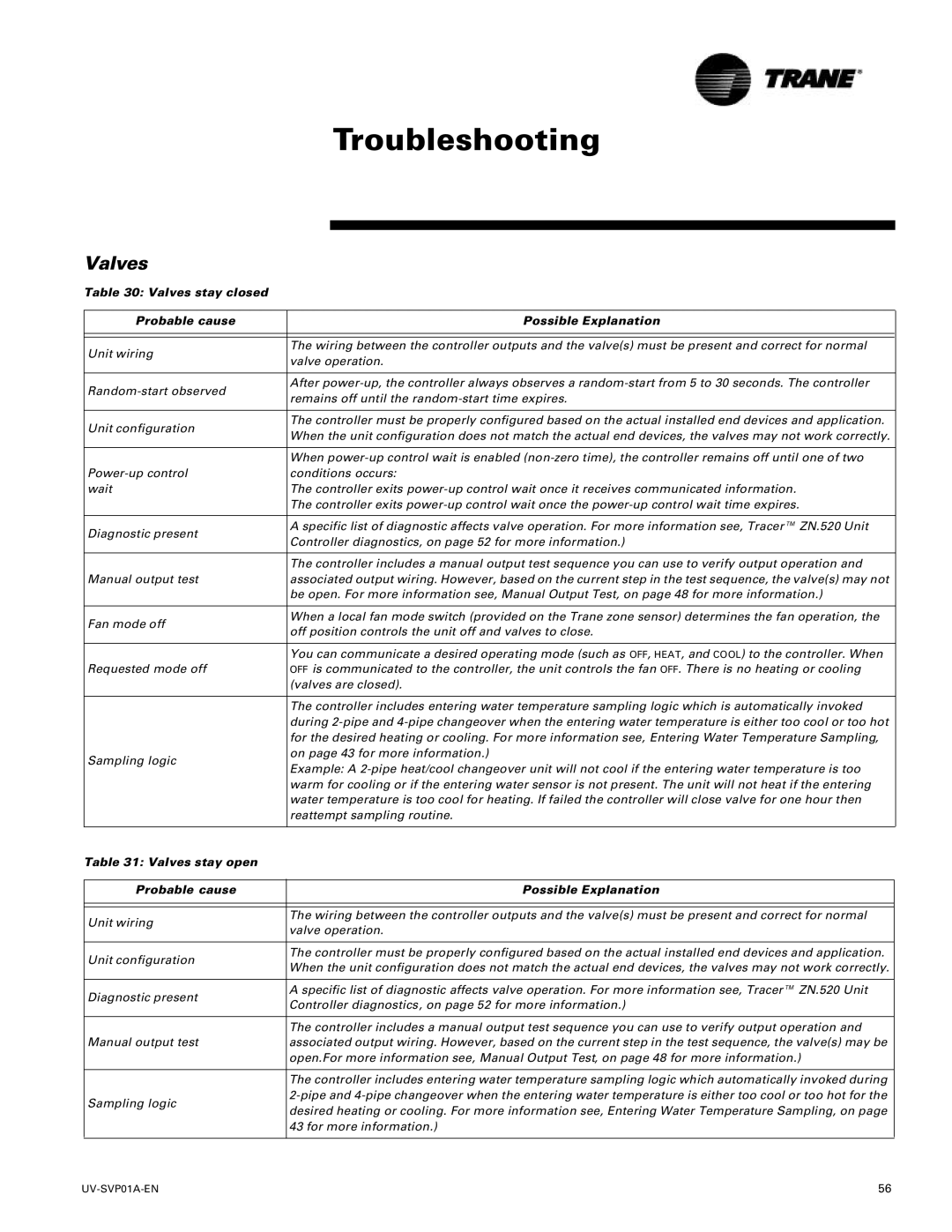
Troubleshooting
Valves
Table 30: Valves stay closed
Probable cause | Possible Explanation | |
|
| |
|
| |
Unit wiring | The wiring between the controller outputs and the valve(s) must be present and correct for normal | |
valve operation. | ||
| ||
|
| |
After | ||
remains off until the | ||
| ||
|
| |
Unit configuration | The controller must be properly configured based on the actual installed end devices and application. | |
When the unit configuration does not match the actual end devices, the valves may not work correctly. | ||
| ||
|
| |
| When | |
conditions occurs: | ||
wait | The controller exits | |
| The controller exits | |
|
| |
Diagnostic present | A specific list of diagnostic affects valve operation. For more information see, Tracer™ ZN.520 Unit | |
Controller diagnostics, on page 52 for more information.) | ||
| ||
|
| |
| The controller includes a manual output test sequence you can use to verify output operation and | |
Manual output test | associated output wiring. However, based on the current step in the test sequence, the valve(s) may not | |
| be open. For more information see, Manual Output Test, on page 48 for more information.) | |
|
| |
Fan mode off | When a local fan mode switch (provided on the Trane zone sensor) determines the fan operation, the | |
off position controls the unit off and valves to close. | ||
| ||
|
| |
| You can communicate a desired operating mode (such as OFF, HEAT, and COOL) to the controller. When | |
Requested mode off | OFF is communicated to the controller, the unit controls the fan OFF. There is no heating or cooling | |
| (valves are closed). | |
|
| |
| The controller includes entering water temperature sampling logic which is automatically invoked | |
| during | |
| for the desired heating or cooling. For more information see, Entering Water Temperature Sampling, | |
Sampling logic | on page 43 for more information.) | |
Example: A | ||
| ||
| warm for cooling or if the entering water sensor is not present. The unit will not heat if the entering | |
| water temperature is too cool for heating. If failed the controller will close valve for one hour then | |
| reattempt sampling routine. | |
|
| |
Table 31: Valves stay open |
| |
|
| |
Probable cause | Possible Explanation | |
|
| |
|
| |
Unit wiring | The wiring between the controller outputs and the valve(s) must be present and correct for normal | |
valve operation. | ||
| ||
|
| |
Unit configuration | The controller must be properly configured based on the actual installed end devices and application. | |
When the unit configuration does not match the actual end devices, the valves may not work correctly. | ||
| ||
|
| |
Diagnostic present | A specific list of diagnostic affects valve operation. For more information see, Tracer™ ZN.520 Unit | |
Controller diagnostics, on page 52 for more information.) | ||
| ||
|
| |
| The controller includes a manual output test sequence you can use to verify output operation and | |
Manual output test | associated output wiring. However, based on the current step in the test sequence, the valve(s) may be | |
| open.For more information see, Manual Output Test, on page 48 for more information.) | |
|
| |
| The controller includes entering water temperature sampling logic which automatically invoked during | |
Sampling logic | ||
desired heating or cooling. For more information see, Entering Water Temperature Sampling, on page | ||
| ||
| 43 for more information.) | |
|
|
56 |
